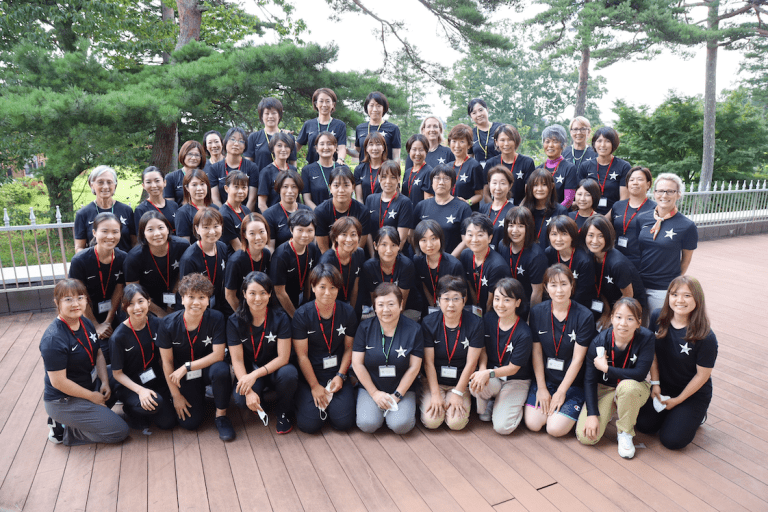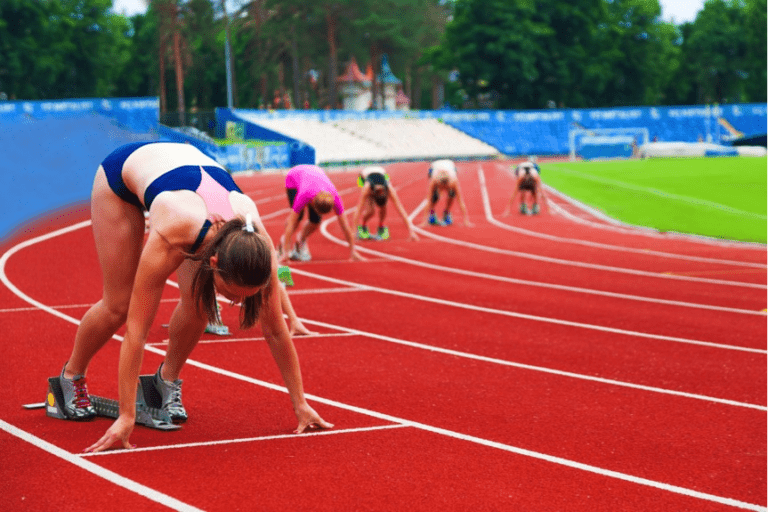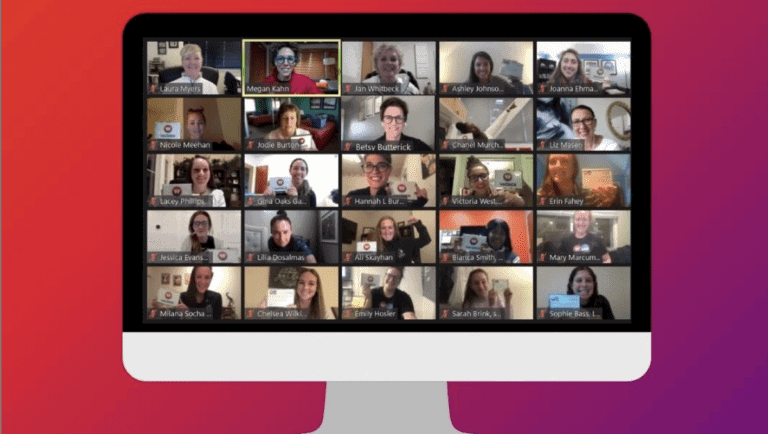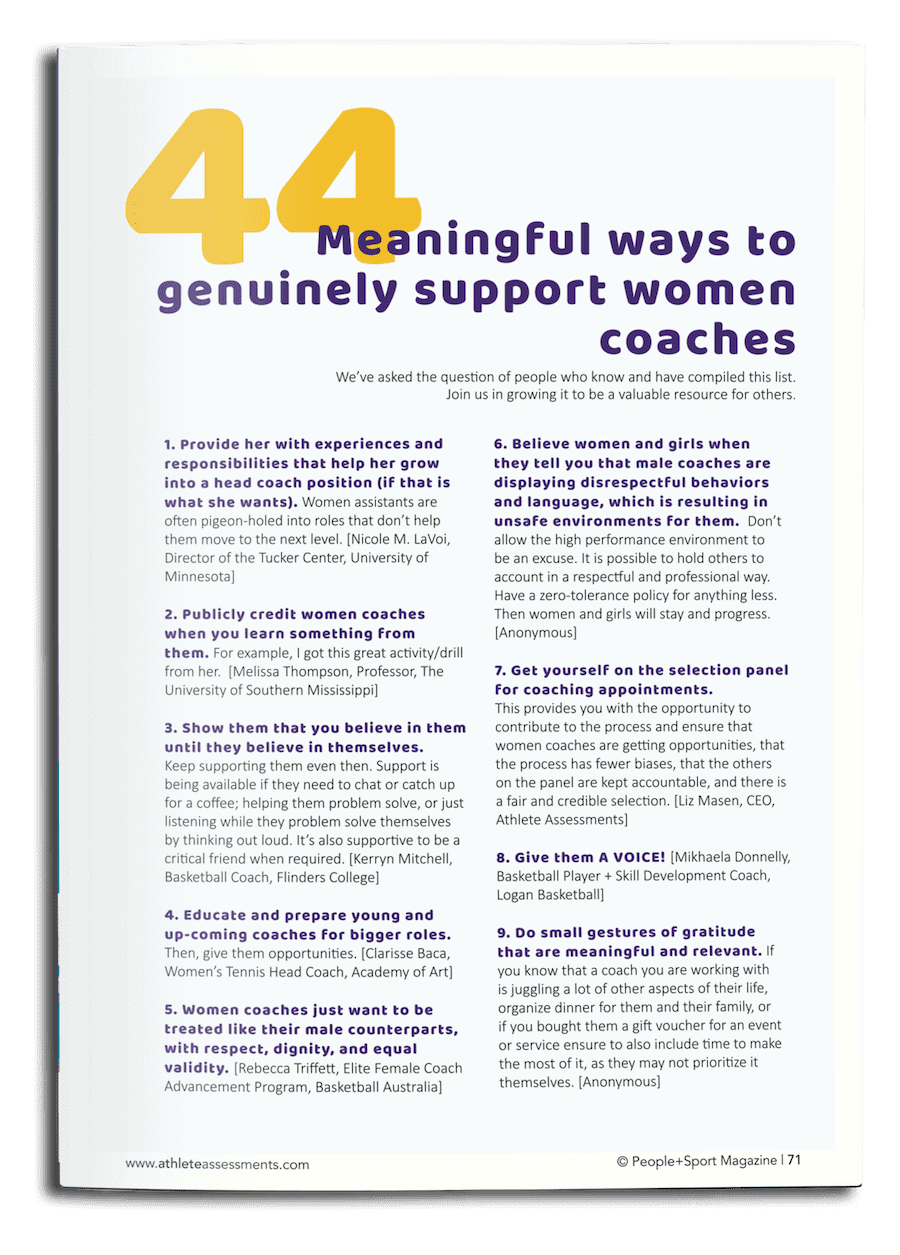In sport, seeing a ‘W’ in the naming of events or leagues that have traditionally been considered to be men’s, only tells a small portion of the story when it comes to the participation of women and girls in sport. While girls’ and women’s opportunities to participate in sport have improved following the passage of Title IX in the United States, boys and men continue to be involved in sport substantially more than their female counterparts, and this gap only grows as they get older. Indeed, according to the National Federation of State High School Associations (2018-2019) boys have 1.13 million more opportunities to play sports than girls each year. The narrative extends well beyond the competition arena with the research clearly stating that from C-suite executives or developing leaders, to those entering the workforce, college, or school, with their practiced problem-solving abilities, leadership, and team building capabilities, a background in sport uniquely positions women and girls for success in any non-sporting endeavor.
Let me start by saying that our investigations by no means reduce the importance of sport in men and boys’ lives, or compare the benefits that sport delivers to each. Instead, they serve to mark the impact sport can have on the development of the individual, in this case women and girls, driving home the need for equitable access and opportunities in sport.
In the last decade significant research has bolstered the discussion on the lasting effects of sport on women and girls. A powerful survey by Ernst & Young (EY) and espnW titled ‘Where will you find your next leader?’ studied the trajectory of Fortune 500 female executives and found the impact of teamwork and skills they learned through their sport had played a pivotal role in their corporate rise. While these results were reaffirming and not surprising to us here at Athlete Assessments, it inspired us to look deeper into these results, and other studies. The aim is to unpack the many attributes identified by successful women in business from across the globe as being associated with their involvement in sport during their most developmental years.
The EY and espnW study, conducted over three years and drawing from many resources, highlighted the following findings:
- Worldwide women make up just 3.4% of CEOs, but 94% of women executives surveyed in the C-suite played sport, with 52% competing at a university level.
- Women who have been athletes earn on average 7% more in later life
(Betsey Stevenson, former Chief Economist at the US Department of Labor and now Professor of Economics and Public Policy at University of Michigan) - 70% cited that sport prepared them to work better in teams and 76% said that behaviors and techniques from high-performance sport could be applied to the corporate setting (Ernst & Young, 2013)
- 12 months later, a follow up study of 400-women executives from around the world identified that participation in sport was something that employers looked for in successful candidates for hiring and promotion (Ernst & Young, 2014)
While these results were reaffirming and not surprising to us here at Athlete Assessments, it inspired us to look deeper into these results and other studies, and unpack the many attributes identified by successful women in business from across the globe as being associated with their involvement in sport during their most developmental years.
Self-awareness
Simply, this is the knowledge or ability to observe the way we behave in our chosen environment and the effect it has on the people around us. Research undertaken as part of the 2008 Canadian Olympic study by Penny Werthner isolated high levels of self-awareness as one of the top factor contributing to medal winning performances (at this level physical ability and access to equipment is virtually indistinguishable).
This research created a platform for the growth of self-awareness within sport, it is now expected that athletes understand themselves and others around them. Many of the top sporting teams and university programs include Athlete Assessments’ AthleteDISC Profile as part of their curriculum or off-season preparation. The profile’s 40-page report highlights the athlete’s strength as a starting point and provides a base for their understanding of the way they prefer to communicate, build relationships, approach tasks, and deal with challenges. Athletes learn to apply DISC by sharing their profiles within their teams or program groups, and this process quickly allows them to see how and when they are different to others. Consequently, DISC becomes a critical framework for not only understanding ourselves, but others around us, knowledge of which becomes highly transferable from the competition arena to the corporate environment.
Self-belief and Self-confidence
Weekly results, whether they are personal bests or numbers on the score board, contribute to an inner knowing of capabilities. As identified by the Women’s Sports Foundation, girls and women who play sports have higher levels of confidence, self-esteem, a more positive body image, and higher states of psychological well-being and safety, while experiencing lower levels of depression; than those who don’t engage in sports.
The WSF also highlighted the importance of having a developed illusion of confidence, often learned through getting out into competition and acting confident even if you’re concerned about the potential outcome. The results might relate to a skill we’re still developing, but what is important here is demonstrating that sense of ‘I’ve got this’. Athletes are used to backing themselves when others don’t, and they have learned how to win from behind. They have a history of attempting things and succeeding when statistically it was predicted that they would fail, and it is the comfortability with the potential of failure and willingness to take calculated risks or try something new that is ultimately a marked trait of many successful executives.
Teamwork
Sport is synonymous with the idea of teamwork, even in individual sports when we consider the athlete and the coach as one team, achieving a goal together while each having their own individual roles to play. So, it’s no wonder that 70% of the women executives surveyed in the EY and espnW study believed that a background in sport was helpful to career advancement because it prepares people to work better in teams.
Additionally, women executives surveyed attributed the knowledge of how to work with a diverse group of people who may or may not be your friends and learning how to get the most out of the people you have in your group, as fundamental skills in the corporate setting and ones they had achieved through sport. The ability to motivate others and build strong teams were also valued highly, and when any athlete has spent most of their formative years creating solutions for achieving these, it’s no wonder 77% of c-suite women see those with a sporting background as a marker of employability.
Leadership
To be successful in business, obviously a high level of leadership is required and when we consider the EY and espnW report’s findings where 94% of the women executives in the C-suite surveyed had played sport, it’s clear that something more than a coincidence is at play. Sport is an environment which enables a multitude of leadership opportunities for athletes, whether viewed in a formal positional framework in leadership groups or as a captain; informally by empowering someone else through encouragement during a competition or helping them to refine a skill in practice; or as an individual skill that we can all learn and possess. When done right, athletes gain vital experience by practicing effective leadership both on and off the field, building what becomes a subconscious demonstration of the skill and one that is highly transferrable into other facets of their life.
They are also skilled to recognize the important, yet often unspoken element of leadership of knowing when and how to follow or utilize the strengths of others. In espnW and EY’s report ‘Why female athletes make winning entrepreneurs’, leadership was identified as one of the key sports skills that underpin entrepreneurial success, from the perspective of knowing how to build the team you need. Many of the athlete entrepreneurs they spoke to identified that sport has taught them the value of learning from a great coach. When translated into their corporate careers, this encouraged them to seek advisors who could offer different perspectives, suggest new strategic plays, and bolster their resilience.
Driving Standards
The EY and espnW report also noted that of those who had played sport, 86% reported higher levels of discipline were a translating factor in their corporate success. Bridging the gap between where a program or project currently is and where you want it to be takes persistence, insight, an awareness of how the delivery of each skill impacts the outcome of the project and, critically, an ability to build relationships with team members so that fundamental rapport has been established before attempting to hold them to account. In sport, athletes are typically involved in goal setting in the pre-season and then whether directly or indirectly they commit to living and displaying behaviors that will contribute towards achieving that goal. They also understand what it looks like to hold their team members accountable to these standards and the impact it can have if they let even the smallest action go unchecked. In the corporate setting, this knowledge arms leaders with the ability to focus less on the ‘how to’ and more on the ‘do’.
Discretionary Effort
It’s a cliché but it’s true, there is no shortcut to success. When it comes to work ethic and the hard work and rewards equation, female athletes enter the workforce with an understanding well beyond their nonsporting counterparts. Competing in high-performance sport takes dedication and a willingness to go beyond what is expected. According to the NCAA, Division I athletes spend on average 5.7 hours each day on their athletic performance through both practice and competition.
This additional practice is called discretionary effort, and is something that individuals usually only undertake because they enjoy what they do, want to be better, or to get noticed. But a high-performance mindset means having the understanding of the benefits of this effort, making this a non-negotiable, and demonstrates a kind of determination that proves invaluable in the business setting.
Performance under Pressure
In the EY and espnW study, 59% attributed the development of their competitive edge to their participation in sport. While pressure can look and feel different depending on the situation, at the end of the day when we care about an outcome it can cause us to feel pressure in the process. High-performance sport provides athletes with the opportunity to practice their ability to perform under pressure in a variety of situations, a highly transferrable and vital skill for any workplace.
Winning and Losing
Another of the top five reasons in Why Female Athletes Make Winning Entrepreneurs report, resilience and a comfortability with the idea of failure rounded out the list, a concept which is backed by the EY and espnW study which noted that 69% of their women executives who had played sport cited having the ability to deal with failure as an outcome of their involvement. In any workplace, innovation comes from the willingness to try something new and taking calculated risks in the name of development, both of which are two key traits associated with top business leaders. But it’s also the idea of getting back up when things don’t go to plan that plays a critical role in a leader’s success, as the aforementioned report said, it is “the sort of emotional and physical agility that is part and parcel of competitive sport”. In the book, The Confidence Code by Katty Kay and Claire Shipman this notion is emphasized, “Playing competitive sports embodies the experience not just of winning, but the experience of losing. The losing is almost as critical. When you’re low on sprits and you do badly, you have no choice but to pick yourself up and carry on.”
In summary, it is not the results of the scoreboard or possessing of a ‘star’ quality that earmarks female athletes for recruitment in their next endeavor, but rather it is their abilities developed from a time in sport. From having the skills to effectively communicate, understand, and manage their own personal development, show dedication, leadership, and commitment to a team, or demonstrate resilience in the face of adversity, these are all teachable skills that athletes have spent their formative years refining. Meanwhile corporate organizations so often spend years trying to develop foundational elements of these skills in their people. This highlights not only the importance of equitable access to opportunities and participation in sport for women and girls as a factor for future success, but also demonstrates a multitude of learnings that business can take from sport to drive performance in their people.
Where to from here?
If you are preparing female athletes to succeed in life after competition, we encourage you to use any of our free online resources. If you have a story to share, we would also love to hear it and of course if we can help you best just reach out and contact us.
LOVE THIS ARTICLE?
DOWNLOAD YOUR FREE, PRINTABLE PDF COPY BY FILLING OUT THE FORM BELOW!
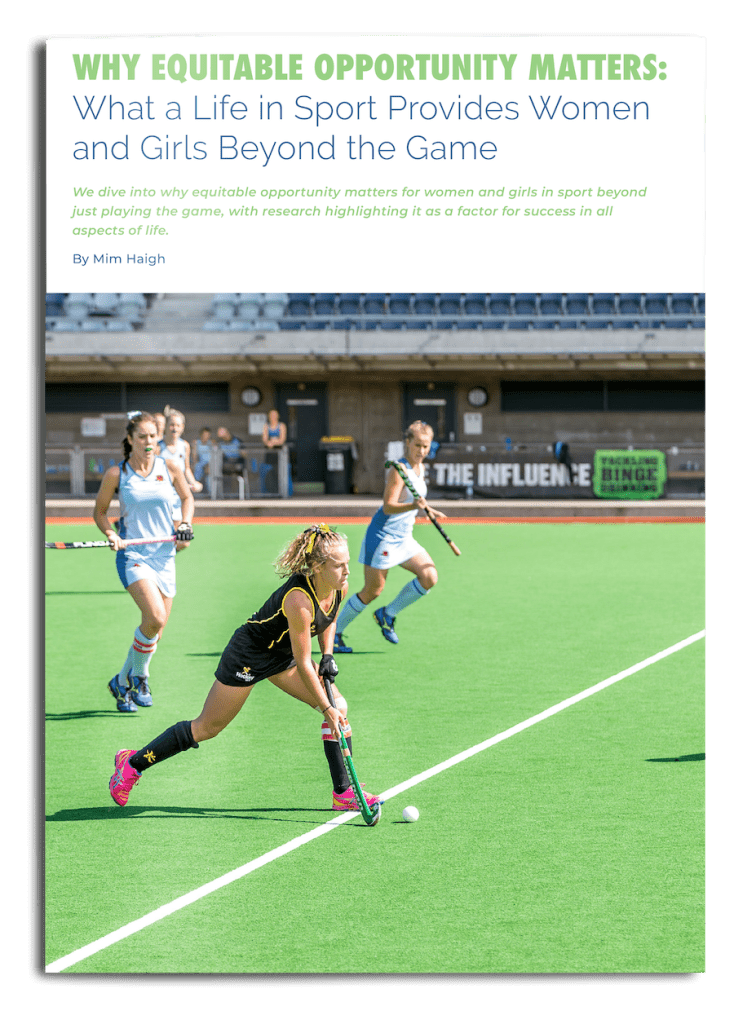
Recommended Articles
Back in-person for the first time in three years, the wave of support for women in coaching grows with the eighth annual Japanese Women Leaders and Coaches Academy in Japan.
If you’re familiar with us at Athlete Assessments, you might know we’re big believers in gender equality and are passionate about equal rights, equal pay, equal opportunity, and equal recognition, not only just for female athletes, but for women in general.
The NCAA Women Coaches Academies have been running for close to two decades and have thousands of inspired alumni who sing the praises of the experience of bringing coaches together to connect, learn and network.
